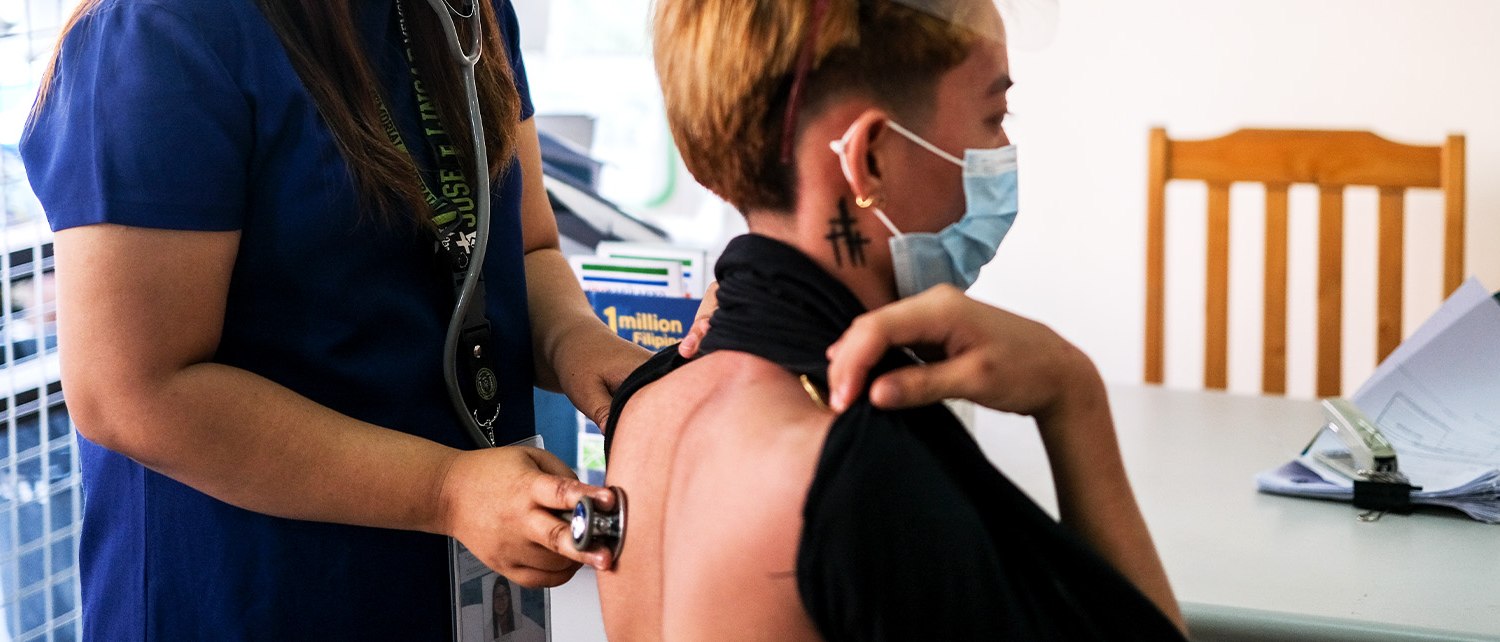Indonesia, Kyrgyzstan, Philippines, Ukraine, Uzbekistan, and Vietnam presented results of LIFT-TB operational research program at the Union Conference on Lung Health; Philippines study yields additional insights on MDR-TB treatment
Programmatic scale-up planned in all LIFT-TB countries; Myanmar, Kyrgyzstan, Uzbekistan, Ukraine updated DR-TB treatment guidelines to focus on BPaL, fueled by success of LIFT-TB initiative
PARIS (15 November 2023)—Interim operational research results from five Central and Southeast Asian countries show that the new, shorter drug-resistant tuberculosis (TB) treatment – BPaL (comprised of bedaquiline, pretomanid, and linezolid) – had a 94.5% cure rate in countries with a high burden of drug-resistant TB (DR-TB). Interim results of this research, along with results from the Ukraine program, were presented at the 2023 Union World Conference on Lung Health in Paris, in addition to four abstracts from the Philippines on additional advantages of the BPaL regimen.
Operational research (OR) in these countries was part of the LIFT-TB program, which provided funding, resources, technical assistance, and wide-ranging expertise from multiple partners for seven countries (Indonesia, Kyrgyzstan, Myanmar, Philippines, Ukraine, Uzbekistan, and Vietnam) to advance the implementation and rollout of the BPaL regimen. All seven countries have established plans to scale up use of the regimen on a national programmatic basis, and programmatic use is underway in four of the seven countries. At the end of October, Myanmar joined Kyrgyzstan, Ukraine, and Uzbekistan in officially updating its DR-TB treatment guidelines to enable programmatic use of the BPaL regimen for most forms of DR-TB.
“This example will help drive wider and faster uptake of BPaL,” said Sandeep Juneja, Senior Vice President of Market Access at TB Alliance. “By acting quickly, other countries and national TB programs can help save many lives.”
Tuberculosis is one of the world’s deadliest infectious diseases, killing 1.3 million people in 2022 and requiring at least four to six months of treatment with drugs that are decades old. Drug-resistant TB is a growing threat – about 410,000 people had multidrug-resistant TB infections in 2022, but only about 43% received treatment. The BPaL regimen reduces the length of treatment for DR-TB from 18 months or longer to six months, and projects to be more cost-effective than previous therapies. Simpler and more cost-effective therapies can help alleviate some of the burdens that contribute to people with DR-TB going untreated.
Pretomanid as part of the BPaL regimen, developed by TB Alliance, received its first regulatory approval in 2019. TB Alliance launched the LIFT-TB program bringing together a wide range of in-country and international partners, setting an unprecedented pace for the rollout of a new treatment for DR-TB.
“I tried everything before I was given BPaL as part of the research program. I had given up all hope that any treatment would work – I needed a solution,” said Joegene Mangilaya, a participant from the Philippines who was treated with the BPaL regimen. “This novel regimen was like a breath of fresh air after all the struggles. Now, I’m back to normal. Now, I’m a TB survivor.”
The findings from Indonesia, Kyrgyzstan, the Philippines, Uzbekistan, and Vietnam presented together at the Union Conference represent outcomes for 319 out of 576 participants enrolled in LIFT-TB OR programs. These participants whose data is included in the findings completed treatment with BPaL and were confirmed TB-free six months after completion of therapy.
Ukraine was the first country to begin the OR program through LIFT-TB and the program was able to continue treating participants with DR-TB even through wartime conditions. The findings presented from the Ukraine program represent 358 participants who are enrolled on BPaL/M, with 276 still on treatment and 65 having successfully completed treatment.
“In our experience with LIFT-TB and the BPaL regimen, we have seen treatment times decrease from 9-18 months to six, and we’re seeing early signs of high cure rates compared to about 63% cure with longer regimens,” said Iana Terleieva, Head of the Tuberculosis Control and Prevention, Department of the State Institution, Public Health Center of the Ministry of Health of Ukraine. “Even with added challenges as seen through a wartime lens in Ukraine, this shorter, simplified regimen has already made an impact for the treatment of DR-TB. We are hard at work continuing to expand access to the regimen throughout the country, so it can be made available to all who need it.”
In addition, four abstracts from operational research in the Philippines—the second country to launch OR—were presented at the Union Conference. These abstracts showed:
- The BPaL regimen’s overall success rate against some of the hardest-to-cure strains of TB in the Philippines was 97%.
- The BPaL regimen presented few serious adverse events.
- The few times when treatment with the BPaL regimen needed to be interrupted, it was restarted without leading to additional adverse events.
“In the Philippines, the BPaL regimen has exceeded all expectations,” said Dr. Irene Flores, principal investigator of the LIFT-TB OR program at the Jose B. Lingad Memorial General Hospital in the Philippines. “With access to new technologies like BPaL, we can see a day in the near future where we will no longer be a country with a high-burden of drug-resistant TB cases.”
###
About TB Alliance
TB Alliance is a not-for-profit organization dedicated to finding faster-acting and affordable drug regimens to fight TB. Through innovative science and with partners around the globe, we aim to ensure equitable access to faster, better TB cures that will advance global health and prosperity. TB Alliance operates with support from Australia’s Department of Foreign Affairs and Trade, Bill & Melinda Gates Foundation, Foreign, Commonwealth and Development Office (United Kingdom), Cystic Fibrosis Foundation, Germany’s Federal Ministry of Education and Research through KfW, Global Disease Eradication Fund (South Korea), Global Health Innovative Technology Fund, Irish Aid, Korea International Cooperation Agency, National Institute of Allergy and Infectious Diseases, South Korea’s Ministry of Foreign Affairs, Unitaid, and the United States Agency for International Development. For more information, please visit: www.tballiance.org.


